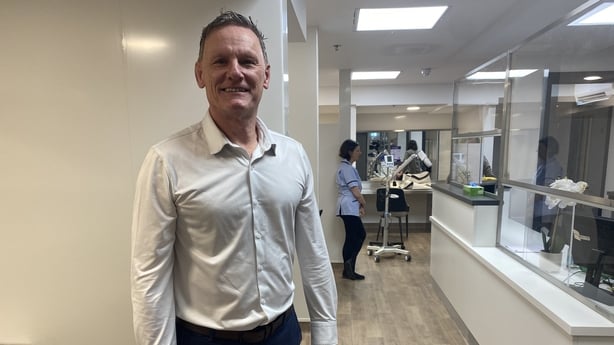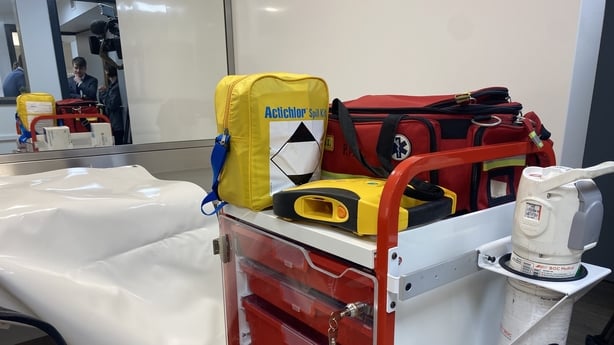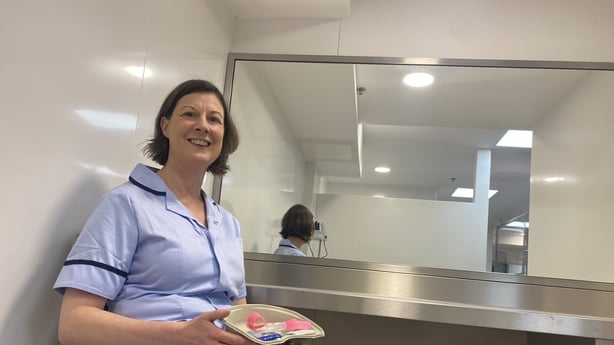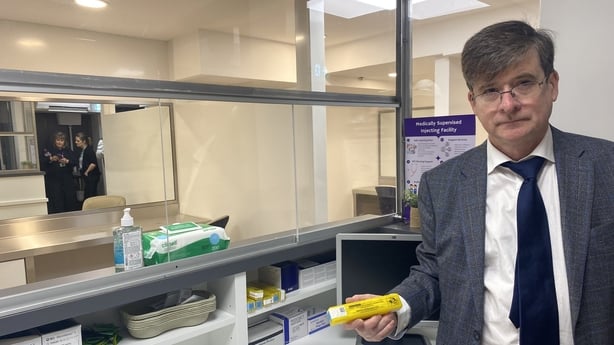Ireland's first medically supervised injection facility is due to open its doors this month at Merchant Quay Ireland's Riverbank centre in Dublin city centre.
Located in the basement of the building, it will provide a clean and supervised space where intravenous drug users can use pre-obtained drugs under the supervision of trained medical professionals.
It is hoped this will bring some of the city's drug use away from surrounding streets, and help to limit overdoses and the transmission of infectious diseases such as HIV and Hepatitis C.
Referrals can also be made to other services including addiction treatment, mental health support and social services.
We need your consent to load this rte-player contentWe use rte-player to manage extra content that can set cookies on your device and collect data about your activity. Please review their details and accept them to load the content.Manage Preferences
It has taken almost a decade of planning, negotiating and building to bring this centre to fruition.
The centre includes a reception area, supervision room and seven mirrored booths, with safe needle disposal facilities.
The final touches were being put to the centre this week by a large team of construction workers.

"It's been a long road," says Eddie Mullins, the CEO of Merchants Quay Ireland.
"In fact, it’s almost nine years to the day when the then minister with responsibility for drugs strategy Aodhán Ó Riordáin achieved Cabinet approval to develop Ireland's first medically supervised injection facility.
"It will make an enormous difference to people who use drugs, people who inject drugs, who do so currently in very unsafe and undignified and dangerous environments."
One service user 'Amber' said it meant everything to her that this service was being launched.
"I just can't imagine how different my life would be if this had been available. We're persecuted on the street. There's nowhere safe to use," she said.
She said she had been shooting up in the toilets of a shopping centre and in parks and alleyways.
"You're terrified the entire time like, I've had a needle break off in my arm because you're constantly tense, you're so paranoid including because you're using drugs and just that atmosphere, just from a practical point of view.
"We're persecuted for doing it. People hate seeing people down back streets shooting up. We don't want to be doing that. We hate doing that. It’s scary, filthy and disgusting and the amount of abscesses I've gone through, the amount of bouts of cellulitis I've been hospitalised for because we're using dirty water, we're using dirty needles, we're sharing needles. There's no dignity. It’s like we're denied basic healthcare because it’s not acknowledged to be a disease caused by trauma and environment."

"It’s not our fault and we can't be hounded and persecuted out of being addicts. In fact, the more miserable you make our lives, the deeper people seek solace in addiction," she explained.
Orla Condren is Deputy Head of Clinical Services who will be overseeing nursing staff at the new facility.
"If they felt that someone was going into an overdose situation, both the social care and the nursing staff are highly trained in terms of how to manage that," she said.
General harm reduction information can also be given out, as well as health advice to reduce hospitalisation and any harm caused to those injecting here. A machine can also help clients find the best vein in which to inject.
A GP will also be there for 20 hours a week who can prescribe antibiotics for complaints such as chest infections which can sometimes develop into pneumonia if left untreated.
"Due to the stigma that goes around injecting drug use behaviour, an awful lot of people are using alone which is seriously dangerous because if you do go into an overdose, there's nobody there to support you," said Ms Condren.
She said sterile water is also necessary for injecting and those taking it on the streets were developing abscesses, which in the most serious cases could result in the amputation of limbs.
Drug overdoses from synthetic opioids, including nitazenes, have also become more common over the last couple of years and the medically prescribed drug Naloxone, which can help temporarily reverse and contain some of the effects of an overdose, can also be given to patients at the centre. Oxygen therapy can also be provided to help people's respiratory rates.

This is an 18-month pilot project, but the HSE hopes that if it goes well, it could be extended.
It will be monitoring what happens at the centre at every stage, in a bid also to help allay some of the concerns that have been raised about having the facility in such a prominent city centre location, which is also just 150 metres from a primary school.
The evaluation process has been tendered out and will be awarded to an academic institution.
"That will allow analysis to take place and six months and at 18 months then to identify whether this project, which is a pilot at the minute, should be extended beyond that period of time," Professor Eamon Keenan, the HSE's Clinical Lead for Addiction Services, said.
As part of that evaluation, a child impact assessment will be carried out to see what the impact is for local children. He said this was something that the Ombudsman for Children had identified as an important element.
Prof Keenan said the new facility was helping to reach one of the most vulnerable groups in society, which was drug users on the street.
He said it was an issue that was visible in many areas of Dublin city and he hoped that the facility would provide a healthcare environment where this activity could take place.
The HSE conducted a survey with people before this process started, which found that 75% of people said that they felt unsafe when they were injecting on the streets, whilst 98% said they wanted privacy.
It also took advice from the European Union Drug Agency and the HSE visited facilities in Denmark, Paris in France, Barcelona in Spain and in Portugal.
"We've seen first-hand the fact that these services can work and can provide interventions to this cohort of people and there's evidence there that not only does it help the individual but it also enhances the surrounding area because injecting is taken off the streets, drug paraphernalia is no longer littering the streets and people are linked in with services."
He said evidence also showed that this was a route for people who are marginalised to get help and advice.
After injecting, clients have half an hour in a 'chill out' area where they can be observed by staff and any necessary referrals can be made.
At the moment there is no testing of drugs at the Merchants Quay site, but he said the timing of the facility was important due to the growing levels of very strong and potentially deadly synthetic opioids that have become a real concern since they began making their way into the Irish market.
"We've seen significant overdose clusters... they're much more potent than traditional heroin," Prof Keenan said.
A rise in the synthetic drugs has coincided with a reduction in the production of heroin in Afghanistan and the drugs have also been found more recently in tablet form, which could be taken by people with no tolerance to opioids.
There are still concerns being expressed in the area that the provision of this facility could attract more drug use and anti-social behaviour into the area, but Mr Mullins said international evidence had proved otherwise.
"The honeypot effect hasn't materialised in other jurisdictions."

He said Merchants Quay had worked closely with the local community for many years and particularly in the last 12 months to address any concerns.
"I'm very confident that when we're up and running, when people are using this service that they will really see the benefits of what it is to a really vulnerable group of people," Mr Mullins said.
He said any decision to extend this type of facility would lie with policymakers, but he added: "This is the test. We'll see how it works."
"Shame just drives you further into the hole of addiction"
For 'Amber', she said there is no doubt in her mind that the new facility will save lives.
"There's absolutely no question about that. Just from infection as well as overdoses as well, there will be finally somewhere safe with respectful medical supervision and I would say from my point of view especially as a woman who has run out of veins in my arms and I literally have to inject into my groin now, having to do that in public is diabolical. There's no dignity in it, no privacy."
She said addiction was an illness and judging people with it did not help.
"It’s handing us back that bit of humanity and safety."
She said her whole life was now consumed with addiction, but she said many people she knew in that situation, were warm and interesting people with talents and gifts. She was hopeful this facility would provide some of those people with a way out.
"Another reason why it consumes our lives so much is because of the way we're persecuted, and society rejects us from having the most basic care."
"It’s one of the most shameful, stigmatised things you can do, yet it rules your life."
'Amber' said a lot of her time was consumed by planning out her day and where she could take her drugs, including with people she did not trust.
"The time we will get back from being hounded from place to place. Going down alleyways to shoot up with people that you don't trust. You wake up with your shoes gone. The amount of times I've been robbed and raped because I'm high down some alleyway, you know. The amount of time and self-worth we get back, I think more people will be able to get clean and contemplate recovery without being hunted 24 hours a day."
She added: "Shame just drives you further into the hole of addiction. This is a big step where society is taking accountability and stopping pushing that shame onto us."







